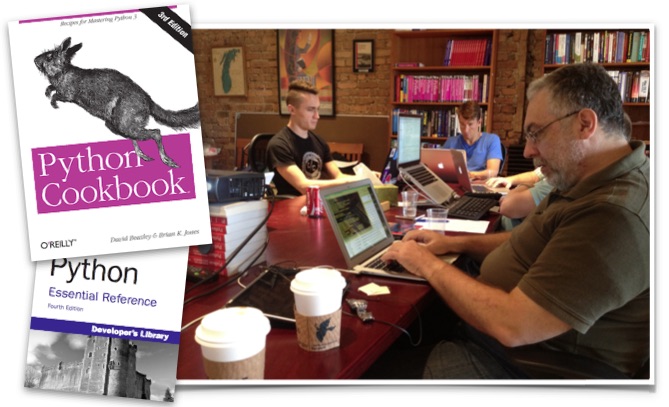Advanced Python Mastery

Upcoming Course Dates (Chicago):
| • Not Currently Scheduled |
Instructor:David Beazley
Price: $2750
Includes:
- Breakfast and lunch
- Course materials
- Python Cookbook, 3rd Ed.
Notice
This course is no longer offered. Course materials can be found here Here. You might consider Advanced Programming with Python instead.
Overview
This is a no-holds barred course that aims to cover the entirety of the core Python language. Major themes include advanced data manipulation, object oriented programming, metaprogramming, design tradeoffs, customization features, and knowing how Python works under the hood.
Target Audience
This course is aimed at Python programmers who want to move beyond the realm of small scripts into the land of libraries, frameworks, and large applications. If you've used various frameworks and wondered about their magic, this course will peel back the layers and explain the mysteries. You'll walk away with a new awareness for what's possible in your own programs.
Instruction Format
Each course day consists of a mix of prepared presentation and hands-on programming exercises. Plan to spend at least 4-5 hours each day working on the exercises and using Python. The course is fully supported by a 580-page guidebook, exercise solutions, and materials to allow further review and study upon course completion.
Prerequisites
This course assumes a working knowledge of Python programming. You should already know know to write and debug programs and be generally familiar with core language features such as functions, classes, and modules. Some prior background with object-oriented programming is also advised.
Syllabus
- Python Review (Optional). An accelerated review of the Python language focused on features that you should already know. Covers the basic language statements, program structure, common datatypes, functions, exceptions, modules, and classes.
- Idiomatic Data Handling. An in-depth look at data handling and data structures. A major focus of this section is on Python's built-in container types (tuples, lists, sets, dicts, etc.) with an eye towards studying their performance properties and resource use. Also covers important programming data-processing idioms such as the use of list comprehensions and generator expressions.
- Classes and Objects. A review of the class statement and how to define new objects in Python. A major focus is on how to properly encapsulate data, and when to use features such as static methods, class methods, and properties. Concludes with a review of some common object-oriented programming techniques and advanced topics including mixin classes and weak references.
- Inside Python Objects. A look at how the Python object system is put together under the covers. Major topics include instance and class representation, attribute binding, inheritance, attribute access methods, and the descriptor protocol.
- Testing, Logging, and Debugging. Learn how to test and debug your code. Covers the doctest, unittest, and logging modules. Information on assertions, optimized run mode, the debugger, and profiler is also presented.
- Working with Code. A detailed look at more advanced aspects of Python functions. Topics include variable argument functions, anonymous functions (lambda), scoping rules, nested functions, function introspection, closures, delayed-evaluation, and partial function application.
- Metaprogramming. Finally understand the secret techniques used by the Python framework builders. This section covers features that allow you to manipulate code. Topics include decorators, class decorators, context managers, and metaclasses.
- Iterators, Generators, and Coroutines. Covers the iteration protocol, generator functions, and coroutines. A major focus of this section is on applying generators and coroutines to problems in data processing. You will learn how to apply these features to large data files and data streams.
- Modules and Packages. This section covers details related to using modules and packages to organize larger programs. A major focus is understanding the underlying behavior of the import statement and some of the more tricky issues related to organizing packages.
About the Instructor
The course is taught by David Beazley, author of the Python Essential Reference, 4th Edition (Addison Wesley) and Python Cookbook, 3rd Edition (O'Reilly Media). David has been actively involved with the Python community since 1996 and was one of the early pioneers of using Python with scientific software. From 1998-2005, he was an assistant professor in the Department of Computer Science at the University of Chicago.